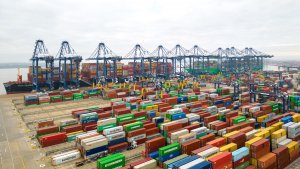Six Drivers Of Foreign Exchange Volatility In 2018
Brexit, Trump, German politics, NAFTA and China will all push and pull at currencies this year.

Uncertainty in the political and economic landscape was the story of 2017 and this unpredictability doesn't look set to change for the year ahead.
With a number of significant events outlined for 2018 that are highly likely to influence financial markets around the globe, one foreign exchange (FX) company has warned businesses to be prepared for further turbulence during the next 12 months.
Trump coming into power and his actions since, the triggering of Article 50 and subsequent divorce proceedings as the UK exits the European Union (EU), and elections in Europe, all caused substantial volatility in currency markets last year.
Noting the devastating effects currency market instability can have on businesses' bottom lines, Godi Financial has highlighted six key drivers of FX volatility in 2018.
The leading financial firm is warning companies of the need to act now to implement a FX strategy that will safeguard against monetary losses in the face of unpredictable currency markets caused by the following factors:
Ongoing UK Brexit negotiations
Brexit negotiations are the obvious point that could cause much anguish in currency markets. Throughout 2018 there will be plenty of twists and turns as more details become clear on the UK's exit from the EU.
If talks stutter, or indeed come to a standstill, another UK election wouldn't be out of the realms of possibilities, which could itself have major implications for the UK and Brexit outlook.
Some of the UK's leading business groups are still calling on Prime Minister Theresa May to agree a Brexit transition deal in a bid to avoid a hard Brexit. Many businesses will turn to contingency plans early this year and prepare for a bleak business outlook if an agreement isn't reached soon.
Recent reports claim the UK government is looking to negotiate a Brexit transitional arrangement but the continuing uncertainty may not only weaken sterling, but damage any optimism amongst British businesses.
The Bank of England (BoE) reflects this, noting that a hard Brexit could see the UK lose tens of thousands of jobs, particularly in the financial services sector.
Germany coalition talks
Germany's Chancellor Angela Merkel is currently in talks with the country's second largest political party, the Social Democrats (SPD), as she attempts to form a new coalition government and end Germany's political deadlock. The talks come following the general election three months ago where Merkel's party was the largest, but without a majority vote.
Immigration has been highlighted as a key obstacle of the talks but Merkel has claimed she is optimistic about the discussions, which are expected to continue until the end of this week.
A new coalition government is unlikely to be formed before the end of the first quarter and if talks break down and a deal is not reached, another election is expected.
This uncertainty in the political arena of the largest economy of the euro zone will cause concern in financial markets, with an unstable German government sending ripples through the euro zone.
Italian election
Italy's next general election is set for no later than spring 2018 and there is concern that a Euro-sceptic government could emerge. Such a result would cause political unrest, which could feed into the financial system and leave poor business sentiment.
The election follows a cycle of votes across Europe, where the general picture has been one of winners that sit on the right of the political scale.
Opinion polls have given a nod to this European trend, as well as regional elections in Sicily, where the centre-right were victorious and provided an important measurement of voters' intentions.
However the centre-right is unlikely to gain an outright majority in the general election and so an alliance would need to be formed, which could mean coalition partners from the left. How stable such an outcome would be is questionable.
Whatever the outcome, Italy's banking woes persist due to non-performing loans and undercapitalisation, so fingers will still point to Italian banking instability, and this can't be ignored.
North American Free Trade Agreement (NAFTA)
US President Donald Trump is continuing to stand firm on his new and controversial proposals for the North American Free Trade Agreement (NAFTA). Canada and Mexico - two of the US's major export markets - are making no signs of accepting the proposals, which are said to lead to a rebalanced and modernised agreement.
The Trump administration's apparent willingness to pull out of NAFTA if serious concessions aren't made is viewed as a significant blow to the US economy and could even prompt a recession.
The cancellation of NAFTA would also mean major damage to automobile companies such as Ford and GM, tech companies like Cisco and Microsoft, as well as agriculture businesses.
Talks currently appear to be making little progress and negotiations will likely drag on through early 2018, creating more uncertainty as to the outcome.
Developments in China
In early December, the State Council Information Office told Reuters that China's economic growth target for this year will represent new changes in the economy as the government places more prominence on higher quality development.
It has been noted that China's leaders will probably maintain 2017s growth target of approximately 6.5 per cent this year, despite risks associated with its very high amount of debt.
If there is a slide in financial growth, it may cause pain and uncertainty not just for China, but for the global market. That said, it is predicted that any changes shall be gradual, but it's always worth keeping on the radar.
Global geopolitical tensions
Defence was stepped up during the latter part of 2017 by Nordic countries in reaction to Russia's increased military activity. As well as the Nordic countries, tensions also exist between Russia and Turkey, Syria and Ukraine, and this will continue to be in focus in 2018. Russian sanctions could be tightened as a result and may well add fuel to the fire.
Strains between North Korea, the US and China could deepen if North Korea continues with its aggressive missile test program, with the risk of a nuclear war being a major concern if it comes to breaking point.
Middle Eastern relations are also still in the spotlight. If the deep rooted tensions between Iran and Saudi Arabia intensified, there could be disruption to energy exports out of the Middle East and oil prices could be impacted. Unease amongst Israel, Lebanon, Syria, Turkey and Iraq could have further implications.
These geopolitical risks may hurt financial market sentiment, and could subsequently spark volatility in an array of currency markets.
Paul Langley is managing director of Godi Financial.
Thanks for signing up to Minutehack alerts.
Brilliant editorials heading your way soon.
Okay, Thanks!


